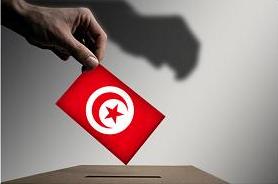Tunisians cast their ballots on Sunday, with voters turnout exceeds all projections.
 |
| A candidate addresses supporters during an election campaign |
In the first free elections since the ouster of deposed President Zine El-Abidine Ben Ali following a popular uprising, Tunisians cast their ballots on Sunday, with voters turnout exceeds all projections.
Some 7.2 million eligible voters will elect a 217-member assembly that will write a new constitution after decades of autocratic government.
From 7:00 am (0600 GMT) till 7:00 pm Tunisians can choose from more than 11,000 candidates -- half of them women -- representing 80 political parties and several thousand independents.
The Chief of election commission (ISIE), Kamel Jendoubi told told a press conference in Tunis that the “turnout of Tunisians exceeded all expectations”, adding that the final rate "may exceed 60 percent".
Jendoubi said some political parties had broken a blanket campaign ban that entered into force on Saturday.
"Several parties continued their campaign," he said, adding that some politicians were sending mobile phone text messages aimed at influencing voters.
Earlier, Jendoubi had voters to turn out in numbers "for the great Tunisia, its future, and the martyrs of the revolution who made this historic day possible."
In what is widely regarded as the Arab Spring's first democratic test, hundreds of people queued early morning outside polling stations in the capital and its suburbs, impatient but disciplined.
"Freedom was expensive, we have to pay our dues!" hotel employee Mondher Hamdi, 23, said before setting out to cast his ballot.
ELECTED ASSEMBLY
The elected multi-party body will have the loaded task of appointing an interim president and a caretaker government for the duration of the drafting process, expected to take about a year.
The constituent assembly will also have to choose what type of government the country will have and how to guarantee basic liberties.
Vote counting will start as soon as polling stations close, with results updated live throughout the night. The final tally will be released on Monday.
The Islamic movement En-Nahda is likely to win the biggest bloc of votes in the elections. The party was banned under the rule of Ben Ali, its leader Shiekh Rached al-Ghanouchi was in exile before the uprising. Following the ouster of Ben Ali, Shiekh Ghanouchi returned home.
On Saturday, Jendoubi declared his ISIE polling commission "ready and confident". He also announced that the turning point of the elections abroad Tunisia, which started on Thursday, approached 40%.
Ben Ali was ousted in January. About 300 people were killed in the uprising that deposed Ben Ali and sparked region-wide revolts that claimed their latest Arab strongman Thursday with the killing of Muammar Gaddafi of Libya.
For his part, interim president Foued Mebazaa said he would step down after the historic election.
"I will recognize the results whoever wins and whatever the color of the majority (in the future assembly)", Mebazaa told the Arabic language Assabah appearing Sunday.
"I shall hand over power to whoever is chosen by the constituent assembly as the new president of the republic," he said.
